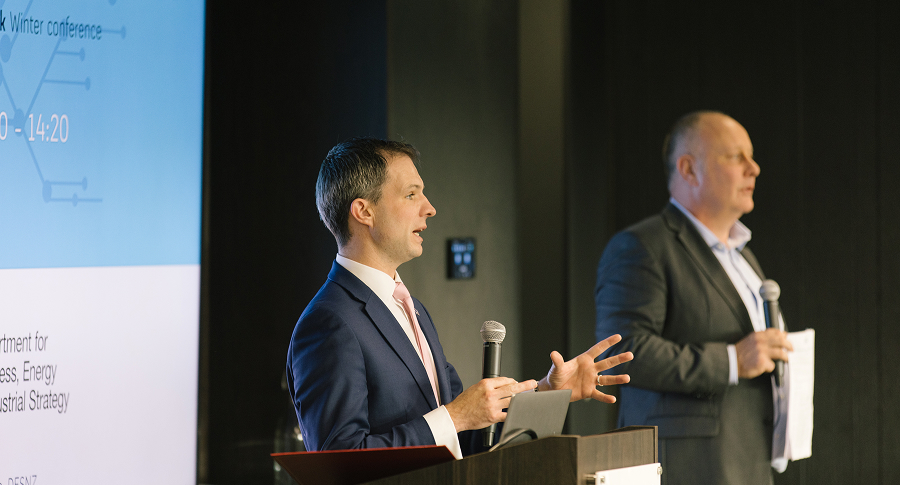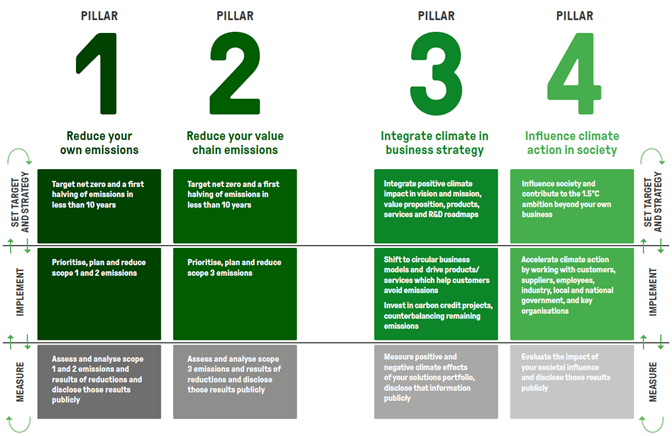This is the fourth in our ongoing series of blogs documenting Regen's internal work to become net zero by 2030.

This is the fourth in our ongoing series of blogs documenting Regen's internal work to become net zero by 2030.

Regen started on the journey of greenhouse gas assessments in mid-2019. In March 2021 Regen joined the UNFCCC Race to Zero, via the SME Climate Hub, making a commitment to meet net zero by 2030. This has strengthened the focus of our internal work to address emissions, as well as provided a strategic framework to align our work with.
The SME Climate Hub framework is broken down into four pillars, as shown in the diagram.

We have examined each source of emissions that we have reported on, engaged with staff through workshops and surveys, looked to best practice guidance, and used this to analyse what changes we can make to reduce emissions.
These changes have been mapped against the pillar structure outlined above into the following action plans.
In many ways for Regen this is the most straightforward to address as we deal with energy issues every day and we have a few former energy managers in our midst, keen to measure and reduce our energy consumption.
Pillar 1 action plan
Quantifying and tackling our scope 3 emissions has been one of the more interesting and challenging aspects of our net zero work.
A specific area of interest has been trying to find more ways to support Regen staff in commuting in a low carbon way. Regen has, for a long time, offered access to the bike to work scheme, provided secure bike storage, offered flexible hours around public transport, and even loans to fund rail season tickets. To better understand how well these are working and to develop new approaches we have run an internal commuting survey for the last two years.
The most recent survey showed that most staff were aware of existing policies designed to facilitate low-carbon commuting, but we could do more to ensure that everyone is aware and understands these, so we will develop our staff handbook to be clearer. From the survey we had a number of potential policies suggested to support low-carbon commuting, as well as how these might change staff behaviour, the results are shown in the charts.

Although only two members of staff currently expect to switch to an EV in the near future, 14 expressed interest in a scheme to support the purchase of an EV, with nine expressing interest in EV charging at the office, and seven saying that these actions would help them buy an EV.
We are now working to implement EV charging, an EV salary sacrifice scheme and more assistance with the 'last leg' of staff commutes into the Exeter office, as highlighted in the pillar 2 action plan below.
Pillar 2 action plan
As a mission-led organisation aiming to accelerate the decarbonisation of the energy system, we hopefully have a head start here. Nonetheless, the work we have carried out in the last two years has allowed us to better understand the steps we need to take towards net zero, update our internal policies and be confident that we are on the right track.
Pillar 3 action plan
Communicating with stakeholders across the energy industry is a key part of our work, and it is no different with our approach to net zero - hopefully if you are reading this you will agree that we are working hard to communicate and encourage others to take steps towards net zero.
Pillar 4 action plan
Indicative modelling of where these action plans could take us is shown in the charts below. Of course, the real trajectory will be dependent on a number of variables, some of which we cannot control, so we will continue to track and report on emissions to check our progress.


These projections don't currently include any carbon offsetting that could be used to reduce our net emissions. Having recently researched green tariffs and ported our electricity to a 'true green' tariff we will be including a reduction against our electricity use for 2021. We will shortly be looking into how carbon offset and reduction projects can be used to help make up the shortfall as we work to reduce our emissions towards 2030.
Sign up to receive our monthly newsletter containing industry insights, our latest research and upcoming events.